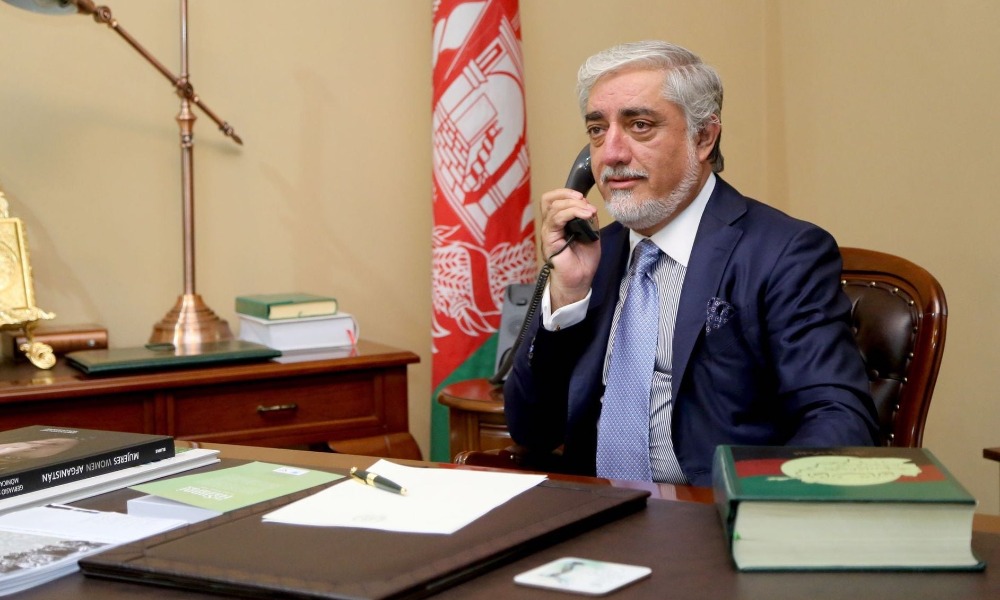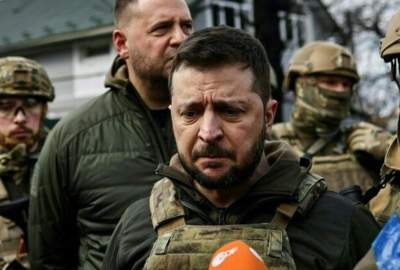Chairman of the High Council for Afghanistan Reconciliation Abdullah Abdullah said he will visit Pakistan within the next few days – the first time since 2008 – and implied issues between the two countries need to be ironed out.
Publish dateWednesday 23 September 2020 - 14:09
Story Code : 219439
He said there is a “lot of mistrust, founded or unfounded,” and that there are “lots of grievances on both sides”, adding that the two countries need to work together as there have been many missed opportunities over the past 40 years.
Addressing a virtual conference of the US Council on Foreign Relations on Tuesday, Abdullah also said some of the 5,000 Taliban prisoners freed over the past two months have returned to the battlefield, which is in violation of the US-Taliban agreement signed in February.
He did say however that he did not know how many ex-prisoners had taken up arms again, but did not think it was the majority.
“But I do know that some have returned to the battlefield, which is a violation of the agreement that they had made. I do know that this has happened. I have examples in some areas, and these people have started insurgency in those – in those areas once they left. But I would say that the majority have not returned to the battlefield. That might be – that might be the right assessment. But some have.”
He also pointed out the current level of violence in the country is very high.
“At the moment, unfortunately, the level of violence is very high. The number of security incidents initiated by the Taliban in different parts of the country has increased, not decreased.
“And it’s important – and that was part of my message yesterday in the – in the Universal Day for Peace – that while the negotiations continue and we assume that both sides have participated in good faith in those negotiations, it’s critical that we see a reduction in violence in order to be able to maintain the popular support for the peace process on the ground. Otherwise, the people of Afghanistan will not – will not understand.”
Abdullah also explained that no one expects or anticipates a comprehensive peace deal to be signed with the Taliban within a “few days”.
“We know that it will take time. But at the same time, since the aim of this is to achieve peace and stability throughout the country, we need to prove it in practice as well that what we can do is reduction – significant reduction in violence.”
He stated the Afghan government’s position on the need for a reduction in violence was very clear.
“But unfortunately, so far the level of violence is very high and to a level that is not acceptable for the people.”
Again he repeated his call to the Taliban and to all partners who have leverage over the Taliban to reiterate the need for less violence.
“But the way forward is to realize that these extremist terrorist elements which are taking advantage of the situation, like al-Qaeda and ISIS, or any other terrorist organization, are not serving any country’s interest. They’re only after the opportunities.
“And when the war ends, these groups will not have a foothold. Otherwise, they will turn against any other – any country that they want, of their choice. They will choose it for themselves. That is – that is what we need to focus on and that will be the focus of our get-together – or my visit to Pakistan, which will be official visit, and I’ll see what the leadership in Pakistan and the leaders of the institutions there [say],” he said.
Differences Clear
On the current talks underway in Doha, Abdullah said they had “started well” and the atmosphere between the two teams, considering their differences, is healthy.
He said the Afghan team senses a “willingness” on the part of the Taliban to take advantage of the opportunity and to contribute.
“Nobody can ignore all the complexities involved…both sides come from two different worldviews – views about the life, about rights of citizens, about the – our vision of our own country, and all of that.
“And at the same time, we have come together with all those differences to find a way to live in peace with one another and maintain our differences of views and let the people decide about it in the future, but at the same time put an – put an end to the misery of the people which have continued for so long,” he said.
He stated there “will be spoilers around. There will be people which may worry about certain things. But as a whole, I can say that the people of Afghanistan are hopeful. At the same time, they have concerns. Do we go back to the old days? What happens to the – to the gains of the people of Afghanistan, which is as a result of too many sacrifices here from us Afghans and our friends and partners?
“And can we – can we get to a point where, while maintaining our views and way of life, agree to live in peace within a country – a sovereign country without allowing terrorist groups, without resorting to violence, and then compete for our ideas peacefully and politically?”
He said the flip side of the coin was if the two sides don’t reach an agreement, then the “continuation of the agony, misery, suffering, migration, and all sorts of other situations that we have been through. That will continue.”
So it’s a moment of being hopeful, but at the same time one shouldn’t lose sight of all those risks which are involved, he said adding that “eventually and ultimately, the absolute majority of our people are for a dignified, durable peace, a country which is unified and does not harbor terrorist groups and respects the rights of its own citizens and contributes to the wellbeing of its own people.”
Addressing a virtual conference of the US Council on Foreign Relations on Tuesday, Abdullah also said some of the 5,000 Taliban prisoners freed over the past two months have returned to the battlefield, which is in violation of the US-Taliban agreement signed in February.
He did say however that he did not know how many ex-prisoners had taken up arms again, but did not think it was the majority.
“But I do know that some have returned to the battlefield, which is a violation of the agreement that they had made. I do know that this has happened. I have examples in some areas, and these people have started insurgency in those – in those areas once they left. But I would say that the majority have not returned to the battlefield. That might be – that might be the right assessment. But some have.”
He also pointed out the current level of violence in the country is very high.
“At the moment, unfortunately, the level of violence is very high. The number of security incidents initiated by the Taliban in different parts of the country has increased, not decreased.
“And it’s important – and that was part of my message yesterday in the – in the Universal Day for Peace – that while the negotiations continue and we assume that both sides have participated in good faith in those negotiations, it’s critical that we see a reduction in violence in order to be able to maintain the popular support for the peace process on the ground. Otherwise, the people of Afghanistan will not – will not understand.”
Abdullah also explained that no one expects or anticipates a comprehensive peace deal to be signed with the Taliban within a “few days”.
“We know that it will take time. But at the same time, since the aim of this is to achieve peace and stability throughout the country, we need to prove it in practice as well that what we can do is reduction – significant reduction in violence.”
He stated the Afghan government’s position on the need for a reduction in violence was very clear.
“But unfortunately, so far the level of violence is very high and to a level that is not acceptable for the people.”
Again he repeated his call to the Taliban and to all partners who have leverage over the Taliban to reiterate the need for less violence.
“But the way forward is to realize that these extremist terrorist elements which are taking advantage of the situation, like al-Qaeda and ISIS, or any other terrorist organization, are not serving any country’s interest. They’re only after the opportunities.
“And when the war ends, these groups will not have a foothold. Otherwise, they will turn against any other – any country that they want, of their choice. They will choose it for themselves. That is – that is what we need to focus on and that will be the focus of our get-together – or my visit to Pakistan, which will be official visit, and I’ll see what the leadership in Pakistan and the leaders of the institutions there [say],” he said.
Differences Clear
On the current talks underway in Doha, Abdullah said they had “started well” and the atmosphere between the two teams, considering their differences, is healthy.
He said the Afghan team senses a “willingness” on the part of the Taliban to take advantage of the opportunity and to contribute.
“Nobody can ignore all the complexities involved…both sides come from two different worldviews – views about the life, about rights of citizens, about the – our vision of our own country, and all of that.
“And at the same time, we have come together with all those differences to find a way to live in peace with one another and maintain our differences of views and let the people decide about it in the future, but at the same time put an – put an end to the misery of the people which have continued for so long,” he said.
He stated there “will be spoilers around. There will be people which may worry about certain things. But as a whole, I can say that the people of Afghanistan are hopeful. At the same time, they have concerns. Do we go back to the old days? What happens to the – to the gains of the people of Afghanistan, which is as a result of too many sacrifices here from us Afghans and our friends and partners?
“And can we – can we get to a point where, while maintaining our views and way of life, agree to live in peace within a country – a sovereign country without allowing terrorist groups, without resorting to violence, and then compete for our ideas peacefully and politically?”
He said the flip side of the coin was if the two sides don’t reach an agreement, then the “continuation of the agony, misery, suffering, migration, and all sorts of other situations that we have been through. That will continue.”
So it’s a moment of being hopeful, but at the same time one shouldn’t lose sight of all those risks which are involved, he said adding that “eventually and ultimately, the absolute majority of our people are for a dignified, durable peace, a country which is unified and does not harbor terrorist groups and respects the rights of its own citizens and contributes to the wellbeing of its own people.”
Source : Afghan Voice Agency(AVA)
avapress.com/vdchxwniw23nzkd.01t2.html
Tags
Top hits







